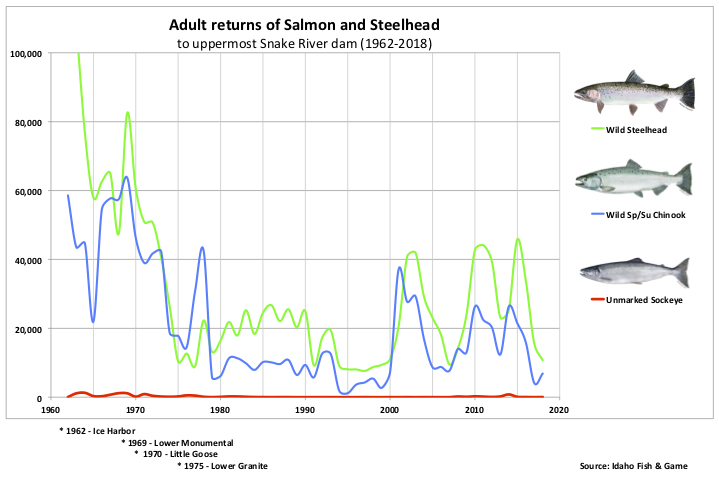forum
library
tutorial
contact

Chinook Bust on the Columbia: Spring Returns
Worse than Forecast on Northwest's Largest River
by Lynda Mapes
Seattle Times, May 31, 2019
|
the film forum library tutorial contact |

|
Chinook Bust on the Columbia: Spring Returns
by Lynda Mapes
|
 LOWER GRANITE DAM, Garfield County -- Darren Ogden hefted the big chinook salmon, meaty and lustrous, a rare and welcome sight in a bad year for returns of adult spring chinook.
LOWER GRANITE DAM, Garfield County -- Darren Ogden hefted the big chinook salmon, meaty and lustrous, a rare and welcome sight in a bad year for returns of adult spring chinook.
Fish managers have had to downgrade their forecasts regarding spring chinook returning to the Columbia River twice, from an already gloomy outlook with returns so far at 30% below initial projections, according to the Washington Department of Fish and Wildlife (WDFW).
"That's a nice fish," said Ogden on Wednesday, as he quickly measured the salmon and checked it for tags before sending it on its way, back to the river. The trap for adult fish at the dam is used for fish studies, including sampling the genetics of salmon on their migration in the river, heading home from the Pacific to their spawning ground. By the time salmon and steelhead and sockeye reach Lower Granite, they have crossed eight major dams, including this one, the inland most dam on the Lower Snake River, the Columbia's largest tributary.
Ogden is a research fishery biologist with the National Oceanic and Atmospheric Administration's Northwest Fisheries Science Center, and he has been working with colleagues from other agencies and the Nez Perce tribe at the trap as the spring run of chinook continues. It's a frustrating year for people working to bring back the biggest, most prized fish in the basin.
The chinook bust is puzzling fish managers.
"Chinook in general have been in the doldrums from the Sacramento to the Yukon, and it is going on for a decade," said Bill Tweit, a special assistant in the fish program for WDFW.
Columbia spring chinook are sought not only by orcas that feed on them but fishermen everywhere. But this year, returns are at much less than 50% of the 10-year average.
Just 53,143 adult spring chinook had returned over Bonneville Dam, about 35 miles east of Portland, as of Wednesday, according to data from the Fish Passage Center, compared with 85,698 at the same time last year. The 10-year average on that date is 144,878.
Low returns of immature chinook, called jacks, also portend continued lean times next year. Just 6,374 jacks had come back by Wednesday, only a little better than the 6,308 last year, and far below the 10-year average on that date of 23,828.
Very few spring chinook fisheries remain open by now, anywhere in the Columbia Basin. Hatchery managers in some areas are going to have to figure out what to do about impending shortfalls of eggs.
"Certainly not the situation we expected preseason; there is a very big difference between a below-average year and a very poor year," said Tweit.
One reason for the poor returns is ocean conditions. These fish went to sea during unusually warm water conditions in the northeastern Pacific. The Blob, as the huge mass of warm water came to be called, disrupted food webs and cratered fish returns all over the region.
Once salmon leave their home rivers, they must fatten at sea and get big fast, to avoid being eaten by something else. And while ocean conditions are beginning to return to a better environment for salmon and other sea life, the effects of The Blob are still being felt.
"We were expecting spring chinook to start to turn, and we were surprised they didn't turn this year, and really surprised it's not better for next year; they should have entered a more benign environment," Tweit said.
Clearly there's more to understand about the ocean environment the fish contend with, once they first exit the Columbia, and beyond farther offshore, he added.
"I would love to be able to say, 'Oh, it is the ocean, for sure,' " he said. "The honest answer is, we don't fully understand the problem."
learn more on topics covered in the film
see the video
read the script
learn the songs
discussion forum
